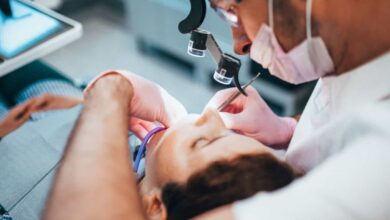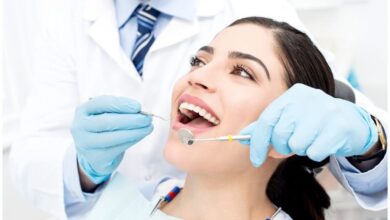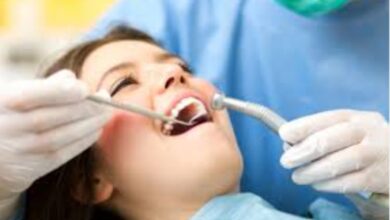What Constitutes An Emergency?

Knowing when to seek immediate dental help can be tricky. What exactly constitutes an emergency? It’s not always obvious. The need for an emergency dentist in Burlington arises when you’re facing a situation that demands prompt attention to alleviate severe pain, stop ongoing bleeding, or save a tooth.
Understanding Dental Emergencies
So, what falls under the umbrella of a dental emergency? It’s more than just a minor toothache. We’re talking about situations that can seriously impact your health and well-being if left untreated. Think of it this way: if you wouldn’t wait to see a doctor for a similar medical issue, you shouldn’t wait to see a dentist either.
Common Types Of Dental Emergencies
Here are some common scenarios that warrant a trip to the emergency dentist:
- Severe Toothache: A throbbing, persistent toothache that doesn’t respond to over-the-counter pain medication. This could indicate a serious infection or abscess.
- Knocked-Out Tooth: Time is of the essence! If a tooth gets knocked out, immediate action can increase the chances of saving it.
- Broken or Cracked Tooth: Significant damage to a tooth, especially if it causes pain or sensitivity, needs prompt attention.
- Abscess: A painful, pus-filled infection around a tooth or in the gums. Abscesses can spread and cause serious health problems if not treated quickly.
- Uncontrolled Bleeding: Bleeding in the mouth that doesn’t stop with gentle pressure after a reasonable amount of time.
When To Seek Immediate Care
Still unsure? Here’s a quick guide to help you decide when to head to the emergency dentist:
- Severe Pain: Pain that is unbearable and interferes with your ability to eat, sleep, or function normally.
- Visible Trauma: Obvious injuries to the teeth, gums, or jaw, such as fractures, dislocations, or lacerations.
- Sudden Swelling: Rapid swelling in the mouth, face, or neck, which could indicate a serious infection.
- Difficulty Breathing or Swallowing: These symptoms could be a sign of a life-threatening infection and require immediate medical attention.
It’s always better to err on the side of caution. If you’re experiencing any of these symptoms, don’t hesitate to contact an emergency dentist. Prompt treatment can prevent further complications and get you back on the road to a healthy smile.
How To Choose An Emergency Dentist
Finding the right emergency dentist can feel overwhelming, especially when you’re already dealing with pain or anxiety. It’s important to remember that not all dentists are created equal, and some are better equipped to handle urgent situations than others. When you need an emergency dentist in Burlington, here’s what to look for:
Evaluating Qualifications and Experience
When it comes to emergency dental care, you want someone who knows their stuff. Look for these qualifications:
- Board Certification: This shows the dentist has met specific standards of education and training.
- Years in Practice: More experience often means they’ve seen a wider range of dental emergencies.
- Continuing Education: Dentists who stay up-to-date with the latest techniques are better prepared to handle complex cases.
Checking Availability and Location
An emergency dentist is only helpful if they’re available when you need them and easy to get to. Consider these points:
- Hours of Operation: Do they offer evening or weekend appointments?
- Proximity: Is the office conveniently located near your home or work?
- On-Call Services: Do they have a system for handling emergencies outside of regular business hours?
Reading Patient Reviews and Testimonials
Online reviews can give you valuable insights into other patients’ experiences. Pay attention to:
- Overall Rating: What’s the general consensus about the dentist’s quality of care?
- Specific Comments: Do patients praise their bedside manner, efficiency, or expertise?
- Responsiveness to Feedback: Does the dentist address negative reviews and try to resolve issues?
Choosing an emergency dentist isn’t just about finding someone who can fix your immediate problem. It’s about finding a provider you trust, who can offer compassionate care and help you prevent future emergencies. Take the time to do your research, and you’ll be well on your way to finding the right dentist in Burlington for your needs.
Services Offered By Emergency Dentists
When you’re dealing with a dental emergency, knowing what services are available can really ease your mind. Emergency dentists are equipped to handle a range of issues, providing quick and effective care to get you out of pain and prevent further complications. Let’s take a look at what they typically offer.
Pain Management Techniques
One of the primary goals of an emergency dentist is to alleviate pain. They have several methods to achieve this:
- Local Anesthesia: This is probably the most common approach. The dentist numbs the affected area so you don’t feel anything during the procedure.
- Prescription Pain Medication: For more severe pain, the dentist might prescribe stronger pain relievers to help manage discomfort after the initial treatment.
- Sedation Dentistry: In some cases, like if you’re really anxious or the procedure is extensive, sedation options might be available to help you relax.
Common Emergency Procedures
Emergency dentists perform a variety of procedures to address urgent dental problems. Here are a few examples:
- Tooth Extractions: If a tooth is severely damaged or infected and can’t be saved, extraction might be necessary.
- Root Canal Therapy: This is done to save a tooth that has a deep infection in the pulp.
- Repairing Broken or Chipped Teeth: Emergency dentists can use fillings or crowns to fix damaged teeth and restore their function.
- Re-implantation of Knocked-Out Teeth: If a tooth gets knocked out, there’s a chance it can be saved if you get to the dentist quickly. They’ll try to re-implant it and stabilize it.
Follow-Up Care and Support
Emergency dental care doesn’t just stop after the initial treatment. Follow-up care is also important. Here’s what you can expect:
- Post-Treatment Instructions: The dentist will give you detailed instructions on how to care for your mouth after the procedure, including what to eat and how to manage pain.
- Prescriptions: You might get prescriptions for antibiotics to prevent infection or pain medication to manage discomfort.
- Referrals: If you need specialized care, like from an oral surgeon or endodontist, the emergency dentist can provide a referral.
Getting prompt attention from an emergency dentist can make a huge difference. They not only address the immediate problem but also provide guidance and support to ensure proper healing and prevent future issues. It’s all about getting you back to a healthy and pain-free smile as quickly as possible.
What To Expect During An Emergency Visit
When you’re dealing with a dental emergency, knowing what to expect can ease some of the stress. The whole process is designed to get you out of pain and start fixing the problem as quickly as possible. Let’s walk through what usually happens during an emergency dental visit. It’s all about getting you the expert care you need, fast.
Initial Assessment and Diagnosis
First things first, the dentist will want to figure out what’s going on. This usually involves:
- A quick chat: They’ll ask you about your pain, when it started, and any relevant medical history.
- Visual exam: The dentist will take a close look at your mouth, focusing on the area that’s bothering you.
- X-rays (maybe): Depending on the situation, they might need to take an X-ray to see what’s happening beneath the surface.
Treatment Options Available
Once they know what’s up, the dentist will explain your options. This could include:
- Pain relief: Getting you comfortable is a top priority. This might involve local anesthesia or other pain management techniques.
- Immediate treatment: Depending on the issue, they might be able to fix it right then and there. Think fillings, extractions, or re-implantation of a knocked-out tooth.
- Temporary solutions: Sometimes, a quick fix is needed to stabilize the situation until you can get more comprehensive care.
Post-Treatment Care Instructions
Before you leave, you’ll get instructions on how to care for your mouth after the visit. This might include:
- Medications: You might need antibiotics or pain relievers.
- Specific instructions: This could be anything from how to clean the area to what foods to avoid.
- Follow-up appointments: Depending on the treatment, you might need to come back for a check-up or further procedures.
The dentist will make sure you understand everything before you leave. Don’t be afraid to ask questions! It’s important to know what to expect and how to take care of yourself after the emergency visit.
Insurance And Payment Options
Dealing with a dental emergency is stressful enough without having to worry about how you’re going to pay for it. Let’s break down the insurance and payment options available to you when seeking emergency dental care in Burlington. Understanding your options beforehand can really ease your mind during a tough time.
Understanding Coverage For Emergency Care
Navigating dental insurance can be tricky, but here’s what you should know about emergency dental care:
- Check Your Policy: Start by reviewing your dental insurance policy. Look for details on emergency services, co-pays, deductibles, and annual maximums. Some policies have specific waiting periods before certain procedures are covered, so it’s good to be aware of those.
- Pre-authorization: Some insurance companies require pre-authorization for certain procedures, even in emergencies. Call your insurance provider to see if this is the case and what steps you need to take.
- In-Network vs. Out-of-Network: Find out if the emergency dentist you’re considering is in your insurance network. In-network dentists usually have negotiated rates with the insurance company, which can save you money. Out-of-network dentists may require you to pay more out-of-pocket.
It’s always a good idea to contact your insurance provider directly before your emergency visit. They can give you the most accurate information about your coverage and what to expect in terms of costs.
Payment Plans and Financing Options
If you don’t have dental insurance or if your insurance doesn’t cover the full cost of your emergency treatment, don’t panic. Many dental clinics offer payment plans and financing options to help you manage the expense:
- Payment Plans: Some clinics offer in-house payment plans, allowing you to pay off your bill in installments over a set period. These plans may or may not charge interest, so be sure to ask about the terms.
- Third-Party Financing: Companies like CareCredit specialize in healthcare financing. They offer credit cards specifically for medical and dental expenses, often with low-interest or interest-free periods. This can be a good option if you need to spread out your payments over a longer time.
- Credit Cards: You can also use a regular credit card to pay for your emergency dental care. However, be mindful of interest rates and try to pay off the balance as quickly as possible to avoid accumulating debt.
Finding Affordable Emergency Dentists
Here are some tips for finding affordable emergency dental care in Burlington:
- Shop Around: Don’t be afraid to call different dental clinics and ask about their prices for common emergency procedures. This can give you a sense of the average cost and help you find a clinic that fits your budget.
- Community Dental Clinics: Look into community dental clinics or dental schools in the area. These facilities often offer lower-cost care to those who qualify.
- Ask About Discounts: Some dentists offer discounts for cash payments, students, or seniors. It never hurts to ask if any discounts are available.
Local Emergency Dental Clinics In Burlington
Finding a reliable emergency dentist burlington when you’re in pain can be stressful. Luckily, Burlington has several options for urgent dental care. It’s good to know where to go before you actually need it!
Top-Rated Emergency Dentists
When looking for the best, consider these factors:
- Reputation: Check online reviews on sites like Google, Yelp, and Facebook. See what other patients say about their experiences.
- Services: Does the clinic offer a full range of emergency services, or are they limited? Make sure they can handle your specific issue.
- Technology: Modern clinics often have advanced equipment for faster and more accurate diagnoses and treatments.
It’s worth spending a little time researching different clinics. A good reputation, comprehensive services, and modern technology can make a big difference in your experience during a dental emergency.
24/7 Emergency Dental Services
Not all dental emergencies happen during business hours. Knowing which clinics offer 24/7 services can be a lifesaver. Here’s what to look for:
- Availability: Do they really answer the phone at any hour? Test it out during normal hours to see how responsive they are.
- On-Call Dentist: Is there a dentist physically available, or do they just offer advice over the phone?
- After-Hours Fees: Be aware that 24/7 services often come with higher fees. Ask about these upfront.
Contact Information and Locations
Having a list of clinics with their contact info and locations handy can save precious time during an emergency. Consider creating a simple list with:
- Clinic Name: Obvious, but important.
- Address: Include the full street address for easy navigation.
- Phone Number: Keep it easily accessible in your phone or on your fridge.
- Website: For quick access to more information, like services offered and insurance accepted.
While you’re at it, you might also want to research options for cosmetic dentistry burlington, dental implants burlington, and even invisalign burlington for future, non-emergency needs.
Preventing Dental Emergencies
While not all dental emergencies can be avoided, there are definitely steps you can take to lower your risk. Think of it like this: a little prevention goes a long way. It’s way better to avoid the emergency in the first place than to scramble to find an emergency dentist in Burlington when you’re in pain.
Regular Dental Check-Ups
Regular check-ups are super important. It’s like taking your car in for maintenance – you catch small problems before they become big, expensive ones. During these visits, your dentist can spot early signs of decay, gum disease, or other issues that could turn into emergencies if left untreated. Plus, they’ll give your teeth a professional cleaning, which helps remove plaque and tartar buildup that you can miss at home.
Practicing Good Oral Hygiene
This one seems obvious, but it’s worth repeating: good oral hygiene is key. Brushing and flossing regularly can prevent a lot of problems. Here’s the deal:
- Brush at least twice a day with fluoride toothpaste.
- Floss daily to remove plaque and food particles from between your teeth.
- Use mouthwash to kill bacteria and freshen your breath.
Avoiding High-Risk Activities
Certain activities can put your teeth at risk. Think about it – sports, grinding your teeth at night, or even chewing on hard things. Here are some things to consider:
- Wear a mouthguard when playing sports to protect your teeth from impact.
- If you grind your teeth at night, talk to your dentist about a night guard.
- Avoid chewing on ice, hard candies, or other things that could chip or crack your teeth.
Taking these steps can significantly reduce your risk of needing emergency dental care. It’s all about being proactive and taking care of your teeth before problems arise. A little effort now can save you a lot of pain and money down the road.




